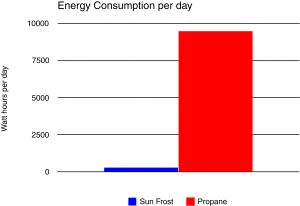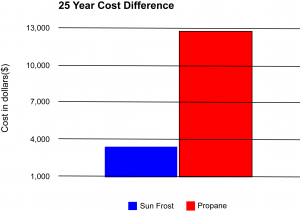Off Grid Refrigeration: Solar Electric Vs Propane
If you live off the grid and need a refrigerator the two most common choices are Electric or Propane. Sun Frost manufactures high efficient electric refrigerators which are an excellent alternative for off grid homes. They can be powered by either AC or DC power.
Solar Power System
The DC models can be powered by 12 V or 24 V batteries. One 100 amp hr 12V deep cycle battery will typically run the Sun Frost RF12 for 3 days without recharging. If a generator is run periodically it could keep the batteries fully charged or the battery could be kept charged by a single 135 watt Photovoltaic (PV) panel. A PV Panel is essentially a battery charger; the 135 watt module produces 7.7 amps in full sun. The panel will provide the energy needed to run the refrigerator with about 4 hours of direct sunlight. On a cloudy day you will still get about 4 hours of equivalent sunlight, but over the whole day. On rainy days part of the energy required would be provided by solar and part by the battery. In the northern states in mid winter there may not be enough sunlight (insolation) to keep the refrigerator running. Under these conditions the batteries could be topped off with a generator, or the refrigerator could be kept in a cool location to lower the energy consumption. In a sunny state like Colorado a 135 watt module will supply energy and keep the refrigerator running all year.
A DC solar electric system is fairly simple, the key components are the solar panels, batteries, and charge controller. The charge controller keeps the batteries from being over charged and also shuts off the load to keep the batteries from being totally discharged.
Cabin Sized Solar System:
If you live off the grid you may find it highly desirable to expand the solar array to a 2 panel system and to add an extra battery. This system can provide enough energy to operate a refrigerator, lights, stereo system, cell phone/computer charging, and a television/entertainment system. The extra energy collected will typically be about 28 amp hours or 336 watt hours (28 amp hours * 12 hours). This is enough energy to run 6 10 watt LED’s for 5.5 hours. The light output of a 10 watt LED is equivalent to the output of a 60 watt incandescent. Except for the batteries, the refrigerator and solar array should provide 25 years of trouble free operation. Good quality batteries will last about 8 years.
The Propane Alternative:
 A propane refrigerator uses what is called an absorption process to cool the refrigerator. This process is powered by heat. The heat can either be produced electrically or by combustion.
A propane refrigerator uses what is called an absorption process to cool the refrigerator. This process is powered by heat. The heat can either be produced electrically or by combustion.
A 10 cubic foot propane refrigerator will typically consume 1.5 lbs, or .375 gallons, of propane per day. The energy content of 1.5 lbs of propane is 32,250 Btu or about 9485 watt hours. The Sun Frost RF12 consumes only 24 amps hours a day, which is equivalent to 288 watt hours a day. That is an astounding 32 times less.
Advantages of Going Electric: Longevity, Safety, & Fire Danger
From the information we are collecting new propane refrigerators last 6 to 12 years. Sun Frost refrigerators have proven themselves to last 25 years or more. The old Servels made in the 1950s could last 50 years or more. However, they are currently being recalled because of dust and rust, often keeps the burners from burning cleanly. As a result they produce carbon monoxide and are responsible for 22 deaths according to the US Consumer Products Safety commission. The new Servels are connected to older models in name only. On newer propane refrigerator the burner area still requires periodic cleaning and flame inspection. Inspection may be difficult if the refrigerator is plumbed against a wall.
Even if the flame is burning cleanly it is consuming oxygen and producing heat, carbon dioxide and water vapor. In Canada, as a consequence of colder conditions, houses are built tighter; and propane refrigerators are required to have a direct outside air supply and exhaust. This is a requirement in all providences except Ontario where a carbon monoxide detector with an automatic gas shut off is required. When propane refrigerators are used in RVs for safety considerations the American Gas Association recommends turning a propane refrigerator off when traveling down the road.
There are about 3000 RV Fires per year and many can be traced to the refrigerator. Even if the fire was not started by the refrigerator its venting system can add air to the fire and accelerate its spreading.
The two major manufactures of propane refrigerators have had many recalls. The recalls typically involve cracks in the cooling system near the area of combustion. The cooling systems contain ammonia and hydrogen, both are combustible. Although the cooling will still operate when the unit is not level, the internal pressure of a unit is higher when the refrigerator is not level. The refrigerator will not always be level while driving, exasperating the leakage problem.
Manufacturers recommend that rugs and flammable materials be kept away from the burner. RV enthusiasts will be glad to know with a Sun Frost performance is not sacrificed if the vehicle is not level.
As a consequence of the inefficiency, a propane refrigerator produces a considerable amount of heat. Typically a 10 c.f. unvented propane refrigerator produces the same amount of heat as a 1000 watt heater running 9.5 hours per day. While this may be appreciated in the winter, come summer your hot kitchen will only become more uncomfortable.
Cost:
 When considering all the costs to keep a refrigerator running 25 years a solar powered Sun Frost costs about 3.7 times less. Over 25 years the total system cost for a Sun Frost would be about $3,456, including the cost of the solar system, refrigerator and replacement batteries. High quality batteries will need to be replaced every 8 years.
When considering all the costs to keep a refrigerator running 25 years a solar powered Sun Frost costs about 3.7 times less. Over 25 years the total system cost for a Sun Frost would be about $3,456, including the cost of the solar system, refrigerator and replacement batteries. High quality batteries will need to be replaced every 8 years.
The total running cost of the propane powered system over 25 years is about $12,800. This includes the refrigerator replacement after 12.5 years. This is a generous estimate for a new propane refrigerators longevity. We assumed the cost of propane to be only $3.00 per gallon, a cost which at times has escalated to $6.00 per gallon.
The total savings over 25 years with a solar powered Sun Frost is $9,300. When considering safety, longevity, maintenance, product quality, carbon footprint and cost a Sun Frost is a clear winner.



Comments are closed.